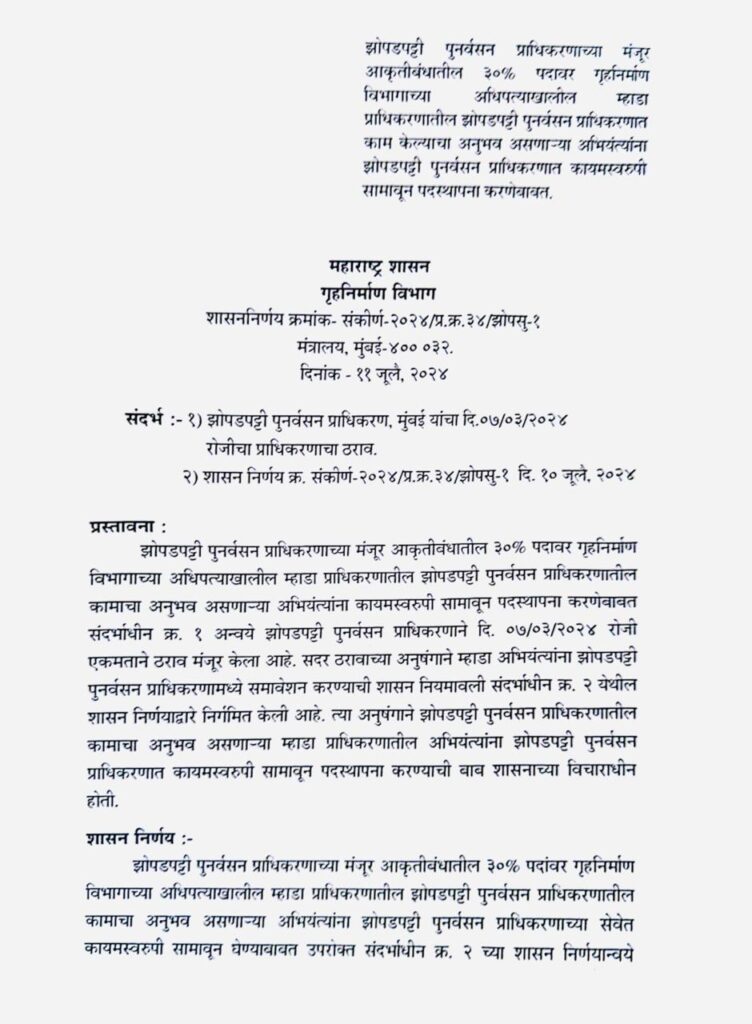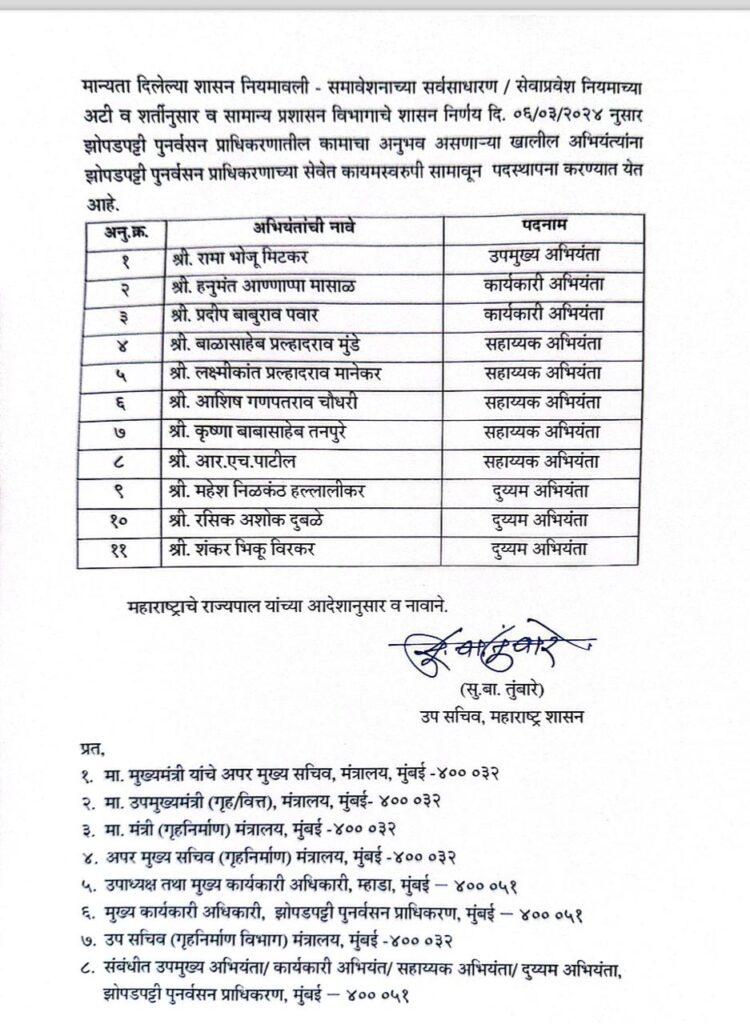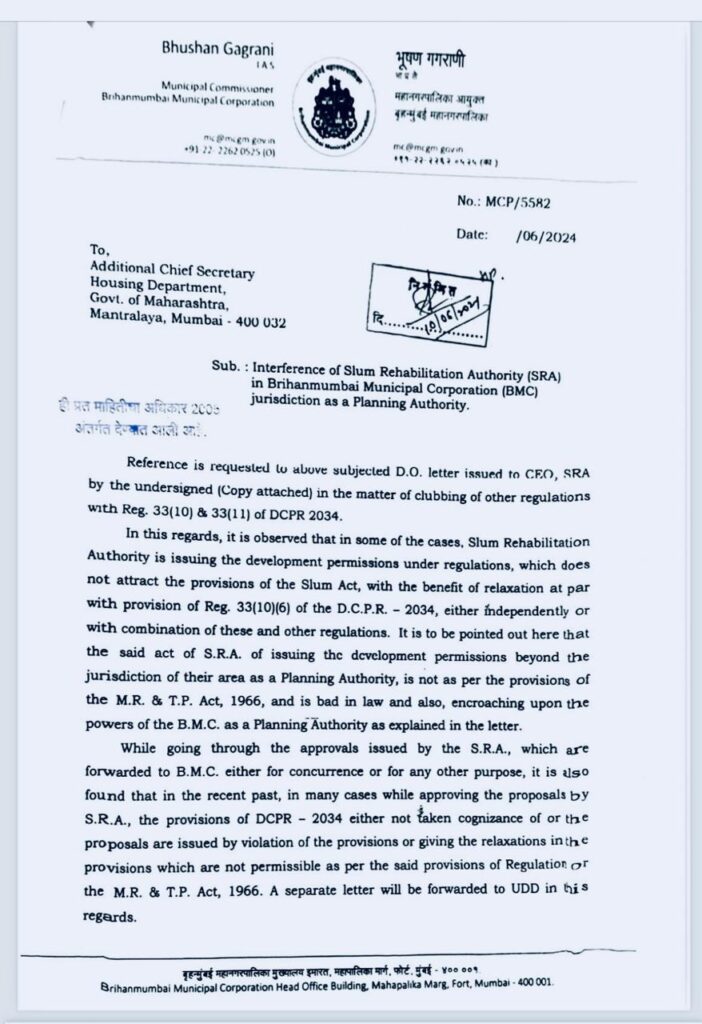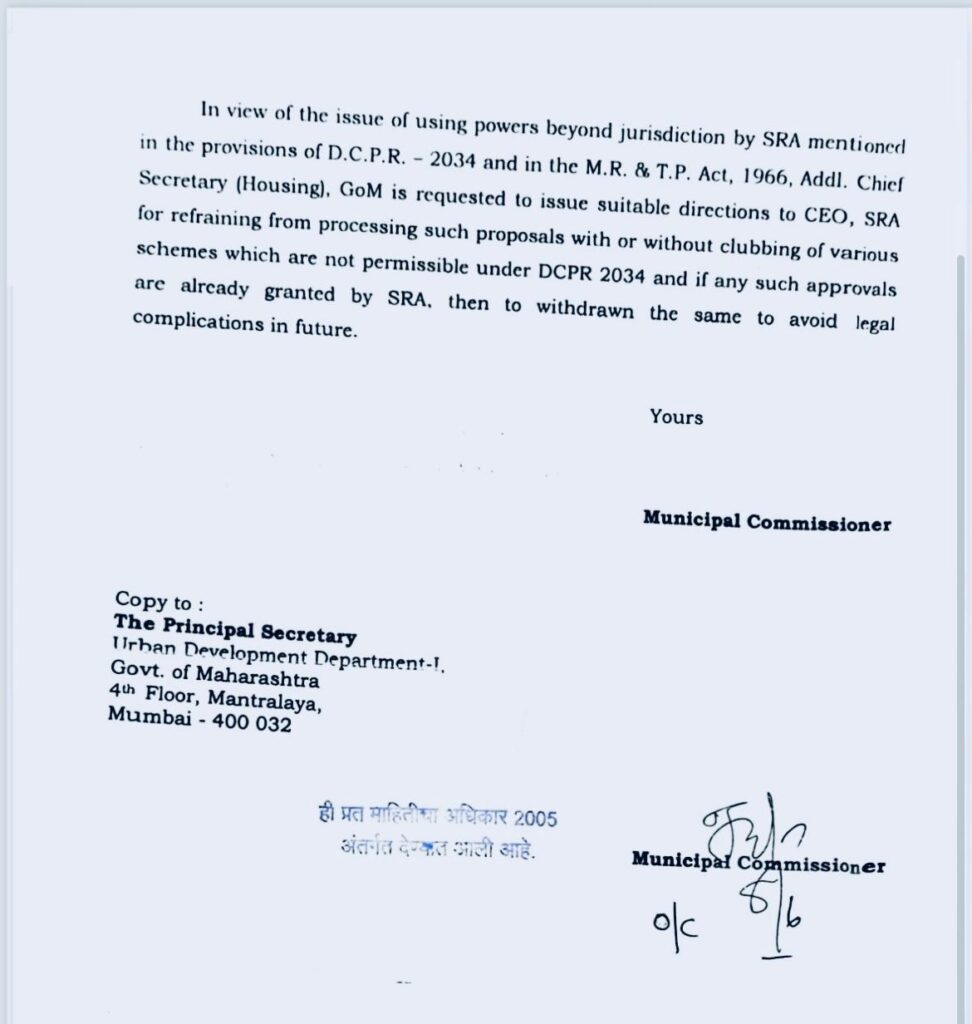PART V
X : @vivekbhavsar
Mumbai
The recent decision by the Maharashtra Government to convert 30% of the posts within the Slum Rehabilitation Authority (SRA) from deputation to permanent status has raised significant concerns and controversies. The Government Resolution (GR) dated July 11, 2024, indicates an effort taken by the officials of the Housing Department, including the Additional Chief Secretary of Housing, Mrs. Valsa Nair Sing, and the concerned Minister, to secure the interests of a select group of officials rather than systematically enhancing the institution’s efficiency. This article aims to explore the implications and legality of these actions, particularly focussing on the bypassing of standard recruitment procedures and the apparent reward of officials with controversial backgrounds.
Background
The conversion of SRA posts, as opposed to the creation of permanent positions, appears to be an attempt to secure the tenure of specific individuals. Reports suggest that the officials who benefited from this decision are from the Maharashtra Housing and Area Development Authority (MHADA) and it seems many of them have histories marked by allegations of legal violations. Such actions raise questions about the fairness and transparency of the decision-making process within the state’s housing department.
Implications of Backdoor Appointments
The act of converting deputed officials to permanent positions without following due process raises questions of legality. The Supreme Court of India and various high courts have addressed issues surrounding “backdoor appointments,” emphasising that such practices can infringe upon the fundamental rights of candidates who aspire to secure positions through competitive examinations. It stands to reason that the recent actions by the Maharashtra Government may be seen as a direct violation of judicial mandates aimed at protecting equal opportunity in public services.
Government Decisions and Their Impact on MHADA Establishment
Due to the government’s sudden decision, MHADA is likely experiencing a shortage of officials. Did the government consider this shortfall in MHADA? How does the government plan to fill the positions of those officials who were originally from MHADA but have now been made permanent in SRA? Why were certain MHADA employees selected and made permanent without following the usual recruitment process for new employees? Does the government have any plans to recruit fresh candidates for MHADA to address this situation caused by the sudden shortfall of officials?

Controversy and Criticism
Several issues have emerged from the implementation of this GR:
1. Illegal Approvals and Misconduct: The Commissioner of the Brihanmumbai Municipal Corporation (BMC) has highlighted instances where SRA officials overstepped their authority, resulting in unauthorised approvals. Despite awareness at higher administrative levels, these officials were made permanent, raising suspicions of favouritism.
2. Financial Implications: The alleged illegal approvals have reportedly led to financial losses amounting to hundreds of crores for both the BMC and the state government.
3. Treatment of Honest Officials: IAS officer Mr. Tukaram Munde, renowned for his honesty and integrity, has faced frequent transfers throughout his career. Recently, while serving as the Secretary of Animal Husbandry and Dairy Development, he successfully implemented an effective Direct Benefit Transfer (DBT) system. Despite this achievement, he has been transferred to a position considered less influential, fuelling allegations that the system penalises honesty and rewards misconduct.

Legal and procedural concerns: The bypassing of the Maharashtra Public Service Commission (MPSC) recruitment procedures raises significant legal questions:
1. MPSC Recruitment Process: The MPSC is mandated to conduct competitive examinations and interviews to ensure a transparent and merit-based selection of candidates for government positions. By circumventing this process, the government potentially violates the principles of equality and fair competition enshrined in the Indian Constitution.
2. Judicial Precedents: The Supreme Court of India has consistently ruled against regularisation of backdoor appointments, asserting that such actions infringe upon the fundamental rights of candidates participating in competitive recruitment processes (e.g., Secretary, State of Karnataka vs. Uma Devi).
Queries to Government Officials: Given the gravity of these issues, pertinent questions arise regarding accountability:
1. Why did the government neglect to adhere to MPSC’s recruitment procedure for the newly permanent posts?
2. What justifications are there for awarding permanent positions to officials with controversial and reported misconduct?

3. Will the ACS (Housing), Mrs. Valsa Nair Singh, the Housing Minister Shri Atul Save, the former Minister of State for Urban Development Department, and the present MLA from Mumbai, Shri Yogesh Sagar, respond to the questions sent to them regarding these issues?
4. Is this decision reflective of a broader culture of unaccountability within the government that emboldens wrongdoing? These queries highlight the public’s demand for transparency and accountability from government officials in Maharashtra.
Legal References and Violations: In light of the developments, numerous articles within the Constitution of India warrant consideration:
1. Article 14 (Right to Equality): The actions taken may evidently contravene the principles of equality before the law.
2. Article 16 (Employment under the State): Any practice of unfair recruitment undermines the constitutional mandate to ensure equality of opportunity in public employment.
This disconcerting trend demands urgent attention to safeguard the integrity of public service and uphold the very tenets of democracy.

Accountability and Response: The glaring silence from Additional Chief Secretary (Housing), Mrs. Valsa Nair Singh, along with other key figures, including the Housing Minister and Ex. Minister of State for Urban Development Department, Maharashtra, and current MLA from Mumbai, Mr. Yogesh Sagar, is causing quite a stir among the public.
Despite this dodgy behaviour, I still hold out hope that these three won’t shirk their responsibilities and will finally break their silence on the pressing questions about bypassing legal provisions to recruit certain officials. It appears they may have bypassed procedures to appoint certain handpicked and allegedly questionable individuals to permanent positions in the SRA.

Conclusion
In conclusion, the Maharashtra Government’s decision to convert 30% of posts within the Slum Rehabilitation Authority (SRA) from deputation to permanent status raises substantial legal and ethical concerns. This move, characterised by the alleged circumvention of standard recruitment protocols and the rewarding of officials with questionable backgrounds, challenges the fundamental principles of transparency, equality, and meritocracy that underpin public service. The implications of these actions are far-reaching, potentially infringing upon constitutional mandates such as the right to equality and the principles of fair competition in public employment.

The controversy surrounding these appointments is multifaceted, encompassing issues of favouritism, financial misconduct, and the marginalisation of honest officials. The highlighted cases of unauthorised approvals and financial mismanagement not only question the integrity of the decision-making process but also hint at systemic flaws within the state’s administrative framework. Moreover, the sidelining of individuals like IAS officer Mr. Tukaram Munde underscores a troubling tendency to penalise integrity while rewarding malfeasance.
From a legal standpoint, bypassing the Maharashtra Public Service Commission’s (MPSC) established recruitment process raises significant questions about adherence to judicial precedents that guard against regularising backdoor appointments. The lack of accountability and transparency from top officials, such as the Additional Chief Secretary (Housing) and other relevant authorities, further fuels public distrust and highlights an urgent need for reform.
To restore public confidence and uphold democratic values, it is imperative that the Maharashtra government address these concerns with transparency and accountability. Ensuring adherence to legal statutes, judicial mandates, and fair recruitment practices is essential to safeguarding the integrity of public service. As the situation unfolds, the demand for answers and corrective actions from the government remains critical to re-establishing trust and promoting a culture of accountability and merit in public administration. This is crucial to preserving the socio-economic fabric of our progressive and culturally rich state.
Recommendations
1. Judicial Review: A judicial review of the GR and the appointments made should be considered to ensure compliance with constitutional principles and legal precedents.
2. Public Inquiry: An independent inquiry into the financial and administrative repercussions of the SRA’s actions should be conducted.
3. Policy Reforms: Reforms should be instituted to strengthen recruitment processes, ensure adherence to merit-based principles, and prevent unauthorised appointments.
This article underscores the urgent need for the Maharashtra government to address these issues transparently and responsibly to restore public confidence in its administrative decisions.



Přijetí hypoteční platby může být obtížné pokud nemáte rádi čekání v dlouhých řadách ,
vyplnění mimořádné formuláře , a odmítnutí úvěru na základě vašeho
úvěrového skóre . Přijímání hypoteční platby
může být problematické, pokud nemáte rádi čekání v dlouhých řadách , podávání extrémních formulářů ,
a odmítnutí úvěru na základě vašeho úvěrového skóre .
Přijímání hypoteční platby může být
problematické , pokud nemáte rádi čekání v dlouhých řadách , vyplnění extrémních formulářů a odmítnutí
úvěrových rozhodnutí založených na úvěrových skóre .
Nyní můžete svou hypotéku zaplatit rychle a efektivně v České
republice. https://groups.google.com/g/sheasjkdcdjksaksda/c/zaDc5RQtmj8